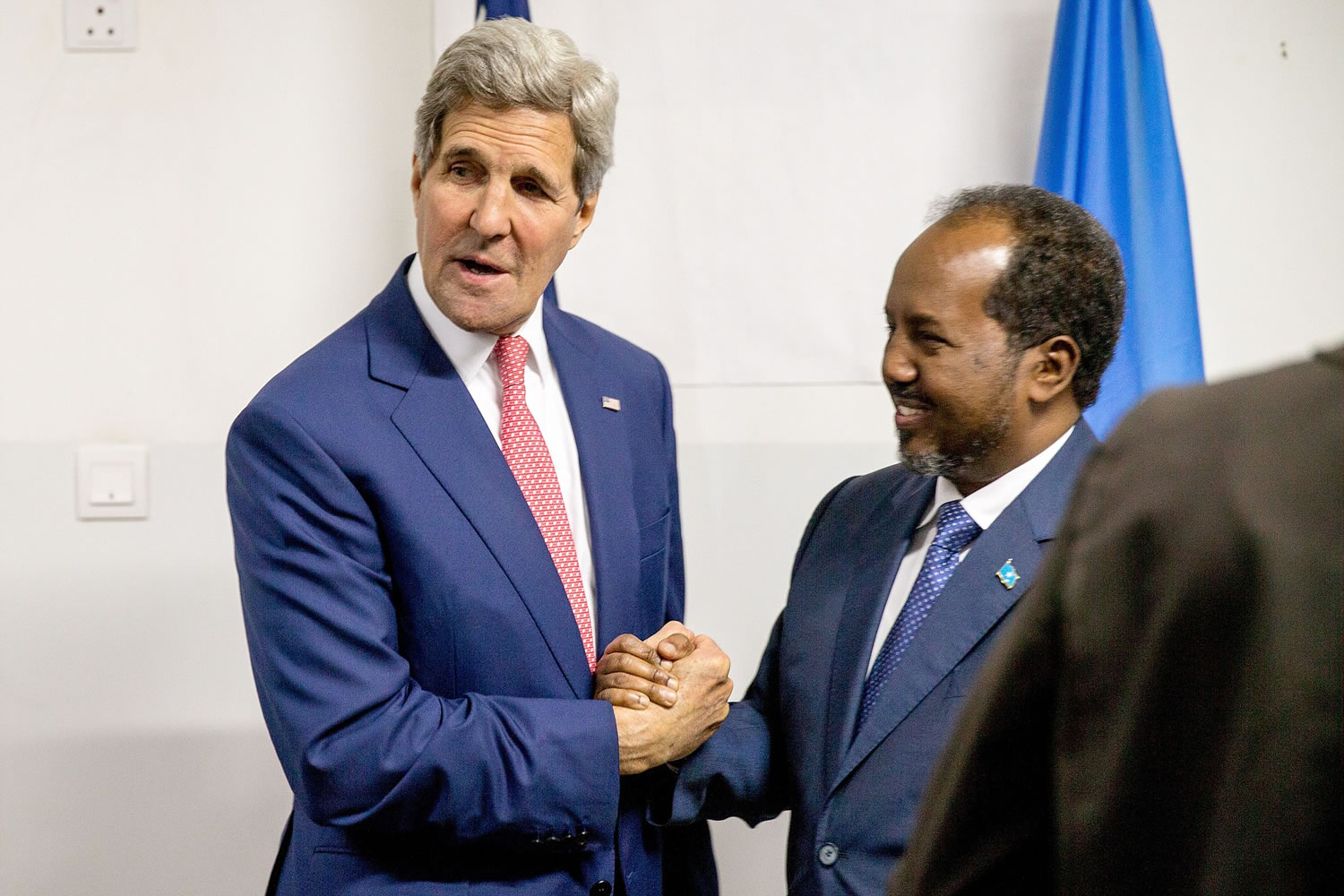JOHANNESBURG — Secretary of State John Kerry paid an unannounced visit to Mogadishu on Tuesday, with its haunting memories of 18 American servicemen slain and their bodies dragged through the streets in 1993.
The stop in the capital of Somalia a day after a visit to neighboring Kenya was not announced before Kerry touched down. Because of concern about a terrorist attack, he didn’t step outside the heavily secured airport, and he was on the ground for just a few hours.
But his meeting with Somali President Hassan Sheik Mohamud sent a strong message of support as the country struggles to emerge from years of war. Mohamud called it a “great moment” for the country.
“More than 20 years ago, the United States was forced to pull back from your country,” Kerry said in a video message to the Somali people, referring to the 1993 battle when two Black Hawk helicopters were shot down in Mogadishu and the 18 U.S. servicemen died. The U.S. government pulled out of Somalia as a result and has yet to formally return.
Security was extremely tight for the visit, which State Department officials said was the first by a U.S. official at Kerry’s level. Top Somali officials were not briefed until Monday that Kerry would arrive.
His statements were designed to send a message that American engagement will deepen if Somalia goes ahead with elections due next year, security improves and the country ends infighting and stabilizes its governance.
“I visited Somalia today because your country is turning around,” Kerry said in the video message. “Now we are returning in collaboration with the international community and bearing high hopes, but also mixed with ongoing concerns.”
Security has improved in the capital in recent years, as a United Nations-backed African force has made headway against al-Shabab. U.S. drone strikes have played a key role in beating back the militant group, annihilating successive leaders.
Al-Shabab has lost control of cities, towns and ports, thus losing revenue from taxes and the lucrative charcoal trade. However, it still controls large areas of the countryside in southern and central Somalia and remains capable of devastating attacks not only in Mogadishu, but in neighboring Kenya. Last month the group killed 148 people, most of them Christian students, in an attack on a university in Garissa, Kenya, not far from the Somali border.
Last month, al-Shabab also attacked the Education Ministry in Mogadishu, killing at least 17 people; left 10 dead in an assault on a restaurant in the Somali capital; assassinated numerous officials, including a former prime minister and a top military officer; and struck a UNICEF bus, slaying nine.
Despite the continuing attacks, Kerry and Mohamud spoke about improved security — and worsening traffic — in downtown Mogadishu, news agencies reported.
“The next time I come, we have to be able to just walk downtown,” Kerry told Mohamud.
“Downtown Mogadishu is very different now than it was two years ago,” the president responded. “The roads are less bumpy and we have traffic jams.”
“Traffic jams,” Kerry replied. “Well, you’re getting normal.”
A State Department official told reporters before the visit that it would underscore the deepening of U.S.-Somali relations and America’s long-term commitment to the nation.
“I think it will send a strong signal to al-Shabab that we are not turning our backs on the Somali people and that we will continue to engage with Somalia until we bring al-Shabab’s terror to an end,” said the official, who requested anonymity following State Department protocol.
The U.S. is planning to establish a permanent embassy in Mogadishu when the country is more secure. In February, President Barack Obama named Katherine Dhanani as the first U.S. ambassador to the country since 1991. She will operate out of the Kenyan capital, Nairobi, making regular trips to Somalia until security is restored.
Kerry also met with the prime minister and other political leaders, regional leaders and civil society representatives.
“Great progress has been made and you have all contributed to that progress, cooperating and working to deal with the issues, with the proper sharing of responsibilities,” Kerry told regional leaders.
As security improves, a major remaining hurdle is chronic political infighting and instability, with three prime ministers in the three years since a provisional constitution was adopted and parliament sworn in.
The infighting has undermined efforts to create a strong government in a nation lacking one since civil war broke out in 1991.



